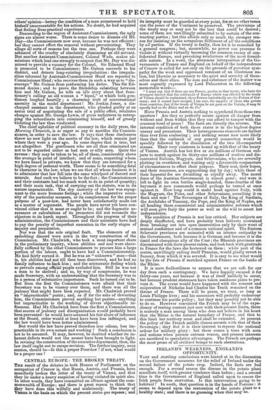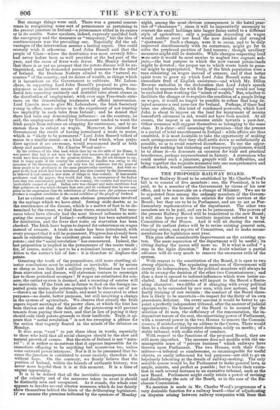IRELAND'S WEAKNESS, ENGLAND'S OPPORTUNITY.
VAST and startling conclusions were hinted at in the discussion on the Government measures for the relief of Ireland under the second failure of thepotato crop. Indeed, the facts are bad enough. For a second season the disease in the potato plant manifests itself, with greater virulence than before ; and a second time is the Government of England called upon to rescue the Irish people from starvation. Is this intervention going to be habitual ? In Booth, that question is in the hands of Fortune : it seems to depend upon the restoration of the potato plant to a healthy state; and there is no guessing when that may be. But strange things were said. There was a general concur- rence in recognizing some sort of permanence as pertaining to the present juncture in Ireland—a permanence either in its causes or in its results. Some speakers, indeed, expressly qualified both the emergency and the measures as "temporary,' but the idea of continuousness was the prevailing one. Especially did the ad- vantages of the intervention assume a lasting aspect. One could scarcely wish it otherwise. Lord John Russell said that the people of Clare—where the destitution was most severely felt— had never before been so well provided at the bad part of the year, and the cases of fever were fewer. Mr. Henley declared that there is as yet no prospect that the potato disease will be ex- tinguished, and he demanded permanent measures for the relief of Ireland. Sir Denham Norreys alluded to the "natural re- sources" of the country, and its mines of wealth, as things which it is incumbent on the Government to cultivate. Mr. Labou- chere, in supporting Lord John Russell's proposal to give em- ployment as an indirect means of providing subsistence, floun- dered into repeating untimely and doubtful tales about abuses in the distribution of employment, with over sage Free-trade stric- tures on the demoralizing tendencies of official intervention. Lord Lincoln rose to give Mr. Labouchere, the Irish Secretary young in office, some advice as to the expediency of not trusting too implicitly to such tales from Ireland ; and he denied that there had been any demoralizing influence : on the contrary, he said, the employment offered by Government tended to wean the Irish people from reliance on cropping for sustenance, and to ac- custom them to subsist on wages. Moreover, he claimed for Government the credit of having introduced a trade in maize, which is "likely to be permanent." Lord John Russell talked of maize in a similar strain—as a kind of food which, when preju- dices against it are overcome, would recommend itself as both cheap and nutritious. Mr. Charles Wood said— By the evidence of the blue book which then lay on the table of the House, it was proved that bad it not been for those very measures the people of Ireland would have been subjected to the greatest distress. He did not hesitate to say, that in many parts of the country the existence of families was owing to the measures of the Government; and not only was the existence but the peace of those people to be attributed to the same praiseworthy exertions. And with re- gard to the food which had been introduced into that country by the Government, he believed it had caused a new state of things in that country. If honourable gentlemen read the papers, they would find that, in consequence of the Indian corn that was continuously poured into the country, the country had received an incalculable amount of good. Indian corn was cheaper and more nutritious food than potatoes—it was much cheaper than oats; and he confessed that lie was san- guine in the expectation that the substitution of Indian corn for potatoes would produce a complete revolution in the social condition of the people of Ireland.
Let us extract some of the more obvious propositions involved in the sayings which we have cited. Setting aside doubts as to the continuance of the disease, which is a matter of fact to be de- termined by the event, we find these views enunciated. The mea- sures taken have already had the most blessed influence in miti- gating the scourges of Ireland—sufficiency has been substituted for destitution, and the fever that waits on starvation has been checked. The Irish have begun to depend for subsistence on wages instead of conacre. A trade in maize has been introduced, with every prospect that it will be permanent. Progress has already been made in substituting the excellent grain maize for the bad root potato ; and the " social revolution " has commenced. Indeed, the last proposition is implied in the permanence of the maize trade ; for, of course, maize is not to be a redundant luxury, a pure ad- dition to the cottier's bill of fare : it is therefore to displace the potato.
. Granting the truth of the propositions, still more startling, ul- terior conclusions must be admitted as inevitable. If by means so cheap as less than half a million yearly, Ireland can be saved from starvation and disease, will statesmen venture to reconsign her to those periodical scourges ? If wages are substituted for con- acre, the cottier system is doomed, and a recasting of estates will be inevitable. If the Irish are in future to feed on the foreign im- ported grain maize, the potato-grounds will be thrown out of use —thrown on the landlords' hands, and must be converted to other purposes—no doubt, better purposes, but still involving a change as the system of agriculture. We observe that already the Irish papers report meetings of the poorer class, at which the hint has thrown out that the failure of the potato-crop will prevent tenants from paying their rent, and that in lieu of paying it they should cede their potato-grounds to their landlords. Truly, it ap- pears that " social revolution " is not too sweeping a phrase for the notion that vaguely floated in the minds of the debaters on Monday.
It does seem "cool" to put these ideas in words, especially, to those who hold that all social changes should be the slow and natural. growth of events. But the state of Ireland is not "natu- ral " : it is rather so monstrous that it appears impossible for its immediate offspring to be anything but monstrous too, unless
i some outward power interpose. Nor is it to be presumed that be- cause the juncture is calculated to cause anxiety, therefore it is without hope. On the contrary, we firmly believe that the position of Ireland, within the bounds of authentic history, was never more hopeful than it is at this moment. It is a time of urgent opportunity. It is to be desired that all the inevitable consequences both of the calamity and of the measures taken to avert it should be distinctly seen and recognized. As it stands, the whole case appears to involve several ulterior measures which do but faintly show themselves behind the hints of the deliberating legislators. If we assume the premises indicated by the speakers of Monday
night, among the most obvious consequences is the hated prac-' tice of " clearances "; since it will be imperatively necessary to convert the small holdings into larger farms suited to a different- style of agriculture ; only a population depending on wages. would neither need nor heed the now dreaded and avenged " ejectment." Such a change, were it to occur, and to be duly improved simultaneously, with its occurrence, might go far to, solve the perplexed question of land tenures ; though auxiliary measures might still be desirable. While'changes respecting land' were astir it would be most unwise to neglect two cognate sub- jects,—the best purpose to which the now vacant potato-lands might be devoted ; the proper use to which waste lands in gene- ral might be appropriated. Truly, if the Irish population were a race subsisting on wages instead of conacre, and if that better spirit were to grow up which Lord John Russell notes as the immediate fruit of English assistance—and which Mr. Dillon Browne embodies in the declaration that Lord John's speech tended to supersede the wish for Repeal—capital would not long be excluded from working the "mines of wealth." But, whether to facilitate the change or to regulate the condition of a people living, on wages, it would no longer be possible to refuse that long de-. layed measure a real poor-law for Ireland. Perhaps, if there had been one already, this kind of condensed poor-rate, which Lord' John is about to impose on the land for repayment of monies henceforth advanced in aid, would not have been needed. At all! events, the impost is an immense stride towards a poor-law., Other measures will suggest themselves as belonging to the same class. It is clear—still assuming the premises—that the present is a period of total unsettlement in Ireland : while affairs are thus unsettled, it is most desirable to take the opportunity of making such arrangements that they shall settle down as satisfactorily as, possible so as to avoid renewed disturbance. To use the oppor- tunity for nothing but tinkering and temporary appliances, would' be to abuse it—to desecrate an occasion for wide and practical' beneficence, perhaps unprecedented in history. A statesman who could master such a juncture, grapple with its difficulties, and bring together the requisite measures into one comprehensive and efficient whole, would immortalize himself.



























 Previous page
Previous page